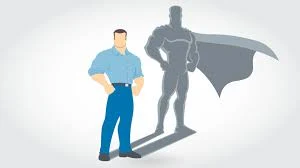The Power of Role Models: Guiding Lights Near and Far
In a world full of noise, distraction, and uncertainty, one of the most underrated assets a person can have is a good role model. Whether it's someone you admire from afar or someone who walks beside you daily, the presence of a role model can shape your identity, inspire your decisions, and elevate your path.
The Role Model from Afar
Famous athletes. Spiritual leaders. Innovators. Activists. Entrepreneurs. These are often the role models we look up to—people whose lives echo with purpose and power, even if we’ve never met them.
Advantages of distant role models:
- Visionary Thinking: They allow us to dream beyond our circumstances. Watching someone make it from nothing gives hope to those walking similar roads.
- Educational Insight: You can study their routines, philosophies, and failures without the personal bias of close emotional ties.
- Emotional Detachment: Sometimes it's easier to absorb lessons from those you’re not emotionally entangled with. It creates a neutral space to admire, learn, and implement without distraction.
Did you know? Studies show that simply observing the disciplined routines of successful people—like reading about the daily habits of Maya Angelou or Steve Jobs—can trigger dopamine responses in the brain that mirror those from actual mentoring relationships.
The Role Model Who's Close
Then there’s the type who’s within reach—an uncle, a coach, a teacher, a friend, or a neighbor. Their proximity gives them power in a different way.
Advantages of close role models:
- Real-Time Influence: They can correct you mid-action, cheer you on during the moment, and offer contextual advice you can apply instantly.
- Emotional Support: When someone who cares about you believes in your growth, you begin to believe in it too.
- Accountability: Close role models often double as mentors. Their belief in you becomes a standard to live up to.
Did you know? Youths with a positive adult role model in their immediate environment are 55% more likely to avoid substance abuse and 60% more likely to finish school with higher grades, according to multiple psychology journals.
The Reverse Effect: When You Are the Role Model
There’s a lesser-discussed aspect of this: being someone else’s role model.
Advantages of being looked up to:
- Self-Motivation: Knowing someone is watching you pushes you to rise to your best behavior—even on days you feel like giving up.
- Purpose Amplification: You start making choices with more intentionality because you’re not just living for yourself—you’re helping define someone else’s path.
- Legacy Building: The people who see you as a role model will carry your values, ideas, and mindset into places you may never reach yourself.
Did you know? People who are seen as role models report higher levels of self-worth and consistency in life habits, even during personal struggles.
A Two-Way Mirror
The beauty of role models is that they reflect and refract. You look at them to grow—and one day, someone else looks at you. It becomes a loop of inspiration, responsibility, and ripple effect.
Whether they’re close or far, public or private, known or unknown—role models can be the compass you need when life feels directionless. And being one? That’s when the compass becomes a legacy.

Comments
Post a Comment